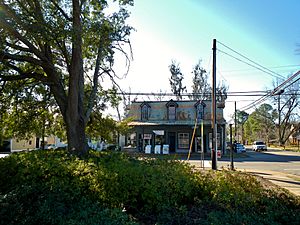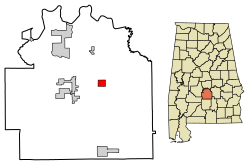Hayneville, Alabama facts for kids
Quick facts for kids
Hayneville, Alabama
|
|
|---|---|

Hayneville Courthouse Square
|
|

Location of Hayneville in Lowndes County, Alabama.
|
|
| Country | United States |
| State | Alabama |
| County | Lowndes |
| Area | |
| • Total | 1.88 sq mi (4.86 km2) |
| • Land | 1.86 sq mi (4.82 km2) |
| • Water | 0.02 sq mi (0.04 km2) |
| Elevation | 243 ft (74 m) |
| Population
(2020)
|
|
| • Total | 830 |
| • Density | 446.00/sq mi (172.16/km2) |
| Time zone | UTC-6 (Central (CST)) |
| • Summer (DST) | UTC-5 (CDT) |
| ZIP code |
36040
|
| Area code(s) | 334 |
| FIPS code | 01-33712 |
| GNIS feature ID | 0119902 |
Hayneville is a small town in Lowndes County, Alabama, United States. It is the main town, also known as the county seat, for Lowndes County. In 2020, about 830 people lived there.
Hayneville is part of the larger Montgomery area. It first became an official town in 1831. However, it stopped being an official town for a while and then became official again in 1967.
The town is located in a rich farming area called the Black Belt. Long ago, this area was known for growing a lot of cotton. Hayneville also used to be a railway center. It had a company called the Hayneville Railway Company, which helped ship goods.
Contents
History of Hayneville
Early Settlement and Naming (1820-1831)
Hayneville was started in 1820 by people who moved from South Carolina. They bought land from the U.S. government. For about ten years, the town was known as "Big Swamp."
Before these settlers arrived, the land belonged to the Muscogee Creek people. They were later forced to move to lands west of the Mississippi River. In 1831, Hayneville was chosen as the main town for Lowndes County. It was named after Robert Y. Hayne, a governor and senator from South Carolina.
Changes in the 20th Century
In the early 1900s, tiny bugs called boll weevils caused big problems. They destroyed cotton crops across the South. Because of this, farmers in Hayneville and the Black Belt started growing different crops and raising animals instead of just cotton.
A school called Lowndes County Training School was opened in Hayneville in 1913. This school was important for the community.
The Civil Rights Era (1965)
The 1960s were a very important time for civil rights in the United States. In 1965, even though most people in Lowndes County were Black, almost none of them were allowed to vote. This was because of old laws in Alabama that made it very hard for Black people to register.
Civil rights activists came to Hayneville and Lowndes County to help people. They taught residents about their rights and helped them register to vote. This happened after a new law, the Voting Rights Act of 1965, was passed.
On August 13, 1965, a group of activists protested in a nearby town. They were arrested and taken to jail in Hayneville. Six days later, they were released. Some of them, including a young man named Jonathan Daniels, went to buy drinks at a store. There, a local deputy shot Jonathan Daniels, killing him. Another person was also shot and hurt.
This event showed how dangerous it was for civil rights workers. Despite the violence, people in Lowndes County kept fighting for their rights. Leaders like Stokeley Carmichael and groups like the Student Nonviolent Coordinating Committee (SNCC) continued to help people register to vote.
They even formed their own political group, the Lowndes County Freedom Organization (LFCO). In 1970, an African-American leader from this group, John Hulett, was elected as the county sheriff. This was a big step forward for the community.
Becoming an Official Town (1967-1968)
Hayneville officially became an incorporated town in 1968. This means it became a legally recognized town with its own local government. The people of Hayneville worked together to make this happen, and a judge officially declared it a town on July 15, 1968.
Geography and Climate
Hayneville is located in central Alabama. It covers an area of about 1.9 square miles (4.9 square kilometers). Most of this area is land, with a very small amount of water.
The town has a humid subtropical climate. This means it has hot, humid summers and mild winters. It gets a good amount of rain throughout the year.
| Climate data for Hayneville, 1991–2020 simulated normals (230 ft elevation) | |||||||||||||
|---|---|---|---|---|---|---|---|---|---|---|---|---|---|
| Month | Jan | Feb | Mar | Apr | May | Jun | Jul | Aug | Sep | Oct | Nov | Dec | Year |
| Mean daily maximum °F (°C) | 57.7 (14.3) |
62.1 (16.7) |
69.6 (20.9) |
76.5 (24.7) |
83.8 (28.8) |
89.1 (31.7) |
91.6 (33.1) |
91.2 (32.9) |
87.3 (30.7) |
77.9 (25.5) |
67.6 (19.8) |
59.9 (15.5) |
76.2 (24.5) |
| Daily mean °F (°C) | 46.9 (8.3) |
50.9 (10.5) |
57.7 (14.3) |
64.6 (18.1) |
72.5 (22.5) |
79.0 (26.1) |
81.7 (27.6) |
81.3 (27.4) |
76.6 (24.8) |
66.2 (19.0) |
55.4 (13.0) |
49.1 (9.5) |
65.2 (18.4) |
| Mean daily minimum °F (°C) | 36.1 (2.3) |
39.6 (4.2) |
46.0 (7.8) |
52.5 (11.4) |
61.3 (16.3) |
68.9 (20.5) |
71.8 (22.1) |
71.2 (21.8) |
66.0 (18.9) |
54.5 (12.5) |
43.2 (6.2) |
38.3 (3.5) |
54.1 (12.3) |
| Average precipitation inches (mm) | 5.09 (129.34) |
4.99 (126.86) |
5.40 (137.27) |
4.21 (106.98) |
4.01 (101.84) |
4.63 (117.55) |
5.20 (132.10) |
4.23 (107.53) |
3.88 (98.57) |
3.07 (77.98) |
4.12 (104.67) |
5.24 (133.15) |
54.07 (1,373.84) |
| Average dew point °F (°C) | 37.9 (3.3) |
40.8 (4.9) |
45.9 (7.7) |
52.7 (11.5) |
61.2 (16.2) |
68.4 (20.2) |
71.4 (21.9) |
70.9 (21.6) |
66.2 (19.0) |
55.9 (13.3) |
46.0 (7.8) |
41.0 (5.0) |
54.9 (12.7) |
| Source: PRISM Climate Group | |||||||||||||
Population and People
| Historical population | |||
|---|---|---|---|
| Census | Pop. | %± | |
| 1850 | 800 | — | |
| 1890 | 355 | — | |
| 1970 | 473 | — | |
| 1980 | 592 | 25.2% | |
| 1990 | 969 | 63.7% | |
| 2000 | 1,177 | 21.5% | |
| 2010 | 932 | −20.8% | |
| 2020 | 830 | −10.9% | |
| U.S. Decennial Census 2013 Estimate |
|||
In 2020, the population of Hayneville was 830 people. Most of the people living in Hayneville are Black or African American, making up about 83.86% of the population. White people make up about 15.18%.
In 2000, there were 1,177 people living in Hayneville. About 37.7% of the homes had children under 18 living there. The average age of people in the town was 30 years old.
Education in Hayneville
The main high school in Hayneville is Central High School. This school used to be called Lowndes County Training School.
Many notable people have attended this school, including:
- Billy Parker, a former baseball player.
- Catherine Coleman Flowers, a civil rights activist.
- Ben Wallace, a famous professional basketball player.
Notable People from Hayneville
- Billy Parker (1942 - 2003), a former professional baseball player.
- Ruth Reese (1921-1990), a civil rights activist and singer.
- Ben Wallace, a former NBA basketball player.
- Kelvin Lawrence, a politician.
Images for kids
-
The Lowndes County courthouse in Hayneville.
-
The Hayneville Post Office. The town's ZIP Code is 36040.
See also
 In Spanish: Hayneville para niños
In Spanish: Hayneville para niños
 | George Robert Carruthers |
 | Patricia Bath |
 | Jan Ernst Matzeliger |
 | Alexander Miles |




